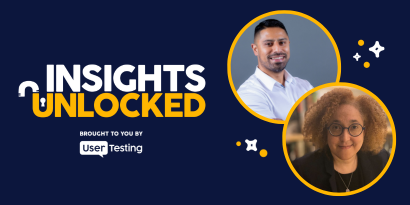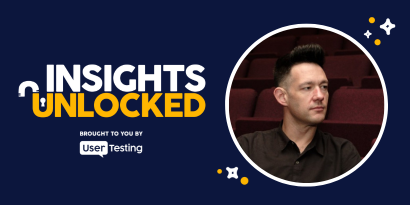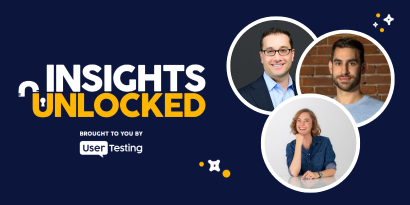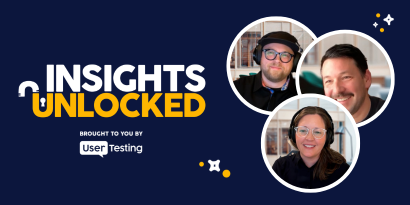
Episode 85 | July 31, 2023
Embracing the Future of Experience Research
In this episode of the Insights Unlocked podcast, UserTesting’s CEO Andy MacMillan talks with UserTesting’s Chief Scientist Ranjitha Kumar about the potential of AI in experience research; the risks involved; and the essential role of humans in shaping the future of product design and user experience.
Embracing the Future of Experience Research
In today's fast-paced digital landscape, designing digital products that truly resonate with users is a complex challenge. How can businesses harness the power of AI to unlock deeper insights and enhance user experiences?
In this episode of the Insights Unlocked podcast, UserTesting’s CEO Andy MacMillan talks with UserTesting’s Chief Scientist Ranjitha Kumar about the potential of AI in experience research; the risks involved; and the essential role of humans in shaping the future of product design and user experience.

Exploring AI in experience research
We asked UX researchers from UserTesting’s Contributor Network their thoughts on how AI will change the way experience research is done. Watch the video below to see what they said.
“I was very excited to see that people saw AI, not as a tool that was going to replace them, but something that would amplify their own abilities and help us move into a future where experience research is elevated at their organizations,” Ranjitha said.
Using AI to prioritize work and strategize
Ranjitha said the integration of AI in experience research has the potential to make researchers' jobs easier and more efficient, as AI can help prioritize work, analyze qualitative data at scale, and even generate research plans based on vague ideas.
“AI can assist at every stage of the experience research lifecycle,” she said. “An AI assistant could help you figure out what to test, when to test. It can help you connect with the right audience. It can suggest templates for you. You can even describe what your research question might be and it can actually generate a research plan for you or a test plan.”
The promise and risks of AI in UX research
The promise of AI and machine learning lies in its ability to generate actionable insights from vast amounts of data. For instance, UserTesting already leverages several machine learning models that can help with audience recruitment, analyze user sentiment from transcript data, identify points of friction in behavioral data and offer up instant insights among other things. Such capabilities empower researchers to quickly gain deeper insights and make data-driven decisions that resonate with end-users.
However, Ranjitha and Andy also highlight the need for caution when leveraging AI. The probabilistic and non-deterministic nature of AI and machine learning introduces the risk of incorrect predictions, such as hallucinations, necessitating a human in the loop to validate and verify results.

Additionally, as some UX researchers shared in the video, there is a concern that AI may replace genuine human connections with users, leading to an incomplete understanding of their needs and experiences.
The role of the human in experience research
Both Andy and Ranjitha stress the importance of maintaining a human touch in the experience research process.
While AI can automate mundane tasks and accelerate insights generation, human intuition remains invaluable in translating data into actionable decisions.
Andy likens it to the QA performed in software development, where automated tools aid but have not replaced humans, AI can serve as a powerful co-pilot, amplifying human capabilities.
AI can help us in a lot of ways get more signals and get more answers, Andy said, but in some ways it can also point researchers to places where they should dive deeper and watch the users use the product. “I think we’re never going to get away from that if we’re going to build great products,” he said.
Ranjitha said the human researcher's expertise is crucial in interpreting AI-generated insights and making informed choices. AI can suggest correlations and patterns, but it's the researcher's responsibility to turn those insights into actionable steps that lead to improved user experiences.
“I think that’s one of the ways that I think about the future of the role really being this AI-assisted superpower where you could probably do more,” Andy said. “But, ultimately, I still think there’s a person at the end of this. Both a person going through the experience, sharing what it’s like to be a user and a person who is consuming that feedback and trying to understand and know customers.”
Generative AI and opportunities for UX research
Andy and Ranjitha also discussed generative AI and its immense potential in experience research. From AI assistants that aid in test prioritization and audience selection to generating research plans and test templates, generative AI can be a game-changer for UX researchers.
And UserTesting has a unique advantage over others, Ranjitha said, because we can train models on the UserTesting data from its global contributor network and all the demographic information from the participants who are generating the data. So, the model could tell you this is the behavior of someone in North America, for example, or this is the behavior of people over the age of 35 and so forth.
“As we head into the future, that actually gives me great comfort that we can in the market have that type of advantage over others who are kind of blindly training over all of this data on the web,” Ranjitha said.
The evolving role of AI in experience research
By integrating AI into the process, UX researchers, product managers, and business decision-makers can unlock deeper insights and streamline their workflows.
By embracing AI as an amplifier of human capabilities—building those superpowers—will usher in a new era of experience research, Ranjitha said. Together, humans and AI can forge a path toward innovation, empathy, and impactful user-centric design.










